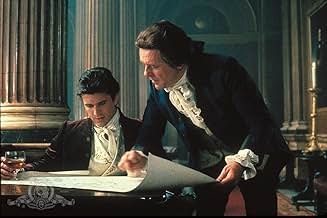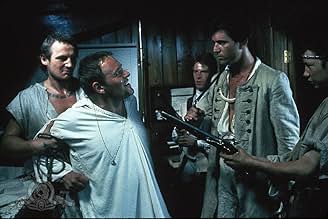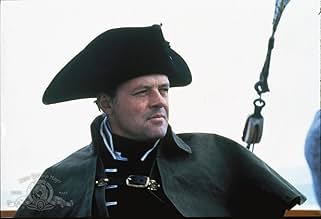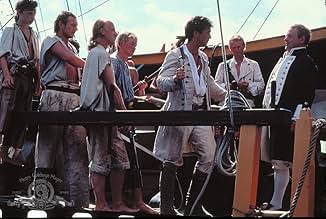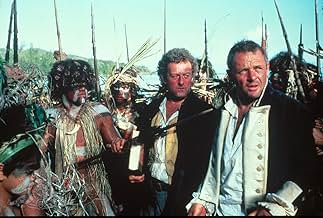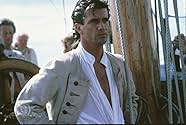Fed up with their Captain's harsh discipline, a sailing ship's crew decides to take action.Fed up with their Captain's harsh discipline, a sailing ship's crew decides to take action.Fed up with their Captain's harsh discipline, a sailing ship's crew decides to take action.
- Director
- Writers
- Stars
- Awards
- 2 nominations total
- Young
- (as Philip Davis)
- Director
- Writers
- All cast & crew
- Production, box office & more at IMDbPro
Featured reviews
If this film was made today with the same cast then it would not have had the same effect because it would have tried to win over it's audience with it's cast but the likes of Day Lewis, Liam Neeson and Mel Gibson were still unknowns in most countries and it was like an older version of the rat pack as they were the fresh faces coming up in the movies in 80's Hollywood especially for Gibson who just made action in the 80's apart from The Bounty and Gallipoli. What makes this movie all the more better was it's haunting soundtrack by Vangelis. Every scene in the film which contains a piece from the soundtrack is just spine tingling and the scene where Fletcher takes over the ship and the men are gathering together to mutiny is just fantastic.
It's not the best film ever but it feels like it when you watch it but then you take it in and you think of some of the scenes they could have included. A few more scenes between Bligh and Fletcher wouldn't have gone a miss and a bit more on Laurence Oliver's character but what we did see of him was more than enough and I shouldn't complain.
This is filled with great actors. They are all good. The older versions have Bligh as the villain and Christian as the hero. This one isn't quite so simplistic. Christian is more of a blank for the most part while Bligh tries to be sympathetic as much as he's allowed. Hopkins isn't doing a crazed dictator as usual but a needy outsider. I'm not sure about the constant back and forth between the time periods. The later time period adds very little to the movie. It is far too long already. The movie needs to get to Tahiti earlier. The turn in Tahiti is terrific with Hopkins finding another gear. The film looks beautiful. If Roger Donaldson could push the pace more and reduce the over 2 hour running time, this could be an even better film.
The Bounty has a lot going for it. It is based on Hough's book, perhaps the best account of the mutiny. The screenplay was written by Robert Bolt, who also wrote such classics as Lawrence of Arabia, Doctor Zhivago, A Man for All Seasons, and Ryan's Daughter. His work shows in the complex, fully realized characters that are the center of this story. And those characters are brought to life by an amazingly strong cast - Anthony Hopkins (an Oscar for Silence of the Lambs) as William Bligh, Mel Gibson (an Oscar for directing Braveheart) as Fletcher Christian, Daniel Day-Lewis (an Oscar for My Left Foot) as John Fryer, and Liam Neeson (nominated for an Oscar for Schindler's List) as Churchill. Of course, none of these actors were famous yet when they performed in The Bounty. Two film giants, Laurence Olivier and James Fox, make cameo appearances as Admiral Hood and Captain Greenham, respectively, members of the Court Martial that tries Bligh on his return to Britain. The rest of the cast is not so well known, but they are all excellent.
Anthony Hopkins' Bligh is definitely not a villain, but he is at best a flawed hero. Hopkins, as he always does, makes the character of Bligh completely believable. He is a superb seaman and a man of unquestioned courage. He is also a very capable leader in the right circumstances, but he has a quick temper and a tendency to shift responsibility from himself to others. And he is an ambitious man with no connections or influence in a society where those weigh as heavily as skill and competency. When the chance to make a name for himself seems to be drifting from his grasp, his frustration and anger is turned on those around him. Hopkins never seems to be acting. He becomes Bligh.
Mel Gibson was a bigger name actor than Hopkins even when this movie was made, but it is obvious that he is not quite in the same league. His is the weakest performance of the primary actors, but that's still not bad considering the caliber of this cast. He does a nice job of letting Fletcher Christian evolve from a rather shallow, genial fop into a tortured leader of a mutiny. He seems to work a little too hard at being the tormented soul during the mutiny but it's a good overall performance and does not detract from the story.
The Bounty does an especially fine job of showing the Tahitians as real people. The costumes and behavior feel completely authentic. Wi Kuki Kaa as King Tynah, although not on screen for very long, manages to create a fully realized and sympathetic character. Tevaite Vernette as Mauatua, Christian's Tahitian wife, is lovely but a bit bland at first. Once the mutineers have left Tahiti on the Bounty, she develops into a stronger character who backs Christian when the other mutineers turn against him.
Roger Donaldson's direction is deliberate. He builds the story slowly and purposefully, piling small scenes one atop another to build a foundation for the intense, emotion-laden scenes of the mutiny and its consequences. The pace may be too slow for modern viewers grown accustomed to the quick-cut editing of contemporary action/adventure movies, but the pay-off is worth the effort for those with some patience.
The Bounty is a beautiful movie. Wonderful cinematography by Arthur Ibbetson makes full use of the sea and tropical islands. There's nothing quite like the appeal of a full rigged ship under sail and we get plenty of the Bounty - brilliant, sun-drenched shots, towering waves and howling winds around the Horn, silhouettes of the ship against color saturated evening skies, and more.
Of the three movies I've seen based on the story of the mutiny on the Bounty, this is my favorite. It is more historically accurate in its presentation of the events, the characters, the ship, and the Tahitian people and culture. A brilliant screen play and fine performances from an exceptional cast are the core of the movie. It is well crafted and beautifully filmed. The pacing may be slow for some, but for anyone interested in this famous mutiny or sea stories, in general, it is highly recommended.
One of the great villainous portrayals on the screen is Charles Laughton's Captain Bligh from the stirring 1935 film. Laughton is pretty unforgettable with that jutting lower lip and that bellowing voice at the crew. Anthony Hopkins has given us a kinder, gentler view of Bligh which may be far closer to the facts.
Bligh certainly was a stern taskmaster as a captain of a naval vessel. In fact he served with distinction in several naval battles during the Napoleonic wars. What he unfortunately had was a sarcastic tongue, something not really needed for what in fact was a peaceful voyage to obtain breadfruit plants.
Scurvy which is caused by a Vitamin C deficiency ran rampant on the ocean going ships of the time, none more so than in British ships because they had the most of them. This was a pretty important voyage, to bring back Tahitian breadfruit to see if it could be cultivated in the climate of the United Kingdom. Maybe the mistake was in not sending a civilian ship to do the job, who knows.
Anyway Bligh punished men who got out of line, no more so than what was normal. The problem arose when after months at sea, his crew got just too used to frolicking among the female population of Tahiti. That would also unfortunately include Bligh's second mate Fletcher Christian, played in this version by Mel Gibson.
It wasn't Bligh's fault they lingered in Tahiti, the plants had to be mature enough to stand the voyage to Great Britain. Nevertheless the lack of discipline there, contrasted with what was expected of British seaman on a naval vessel, a return to that life was what led to the mutiny.
Certainly Fletcher Christian by all accounts was a charismatic guy, he would have to have been to get the men to mutiny. He was portrayed by four charismatic actors, Errol Flynn, Clark Gable, Marlon Brando, and now Mel Gibson. Only his intervention prevented the men from killing Bligh and a few others.
What I like most about this version is the fact that it does give due attention to Bligh's remarkable voyage in a long boat to Timor which was some 1500 miles from where he and the loyalists were cast adrift. It was a remarkable piece of seamanship, no mutinies during that voyage.
The luckless Captain Bligh also had the misfortune to be the Governor of New South Wales, appointed by the Crown, and was overthrown there in a power struggle with the merchants of the colony. That didn't help his historical reputation a bit.
Among the crew of the Bounty you will find Daniel Day-Lewis as John Fryer who Bligh replaced mid voyage with Fletcher Christian and Liam Neeson as one of the mutineers. Laurence Olivier plays Admiral Hood who led the court of inquiry that cleared Bligh of blame for the mutiny.
Still Hopkins and Gibson dominate the film with their skills and talents. Who knows who might bring the saga of this troubled ship next to the screen. This story has fascinated us for generations.
So, for its historical rendering, "The Bounty" excels. Many of these details are not covered, or are skimmed over in the more popular movies. For instance, Bligh was a Royal Navy Lieutenant - not a captain. Bligh was the only navy man and only actual officer on board. Christian was not a first lieutenant, but a master. He and all the rest of the leaders of the crew had the ranks of noncommissioned officers and came from the merchant marine. Christian was a known friend of Bligh's before the voyage. Bligh's first mate had already been chosen, so Christian signed on as junior to him. But, Bligh later removed the other mate, Fryer, and put Christian in his place.
Bligh was an accomplished and skilled naval officer. He had served under Captain Cook on his third voyage to the South Pacific, so he alone knew the area and Tahiti. Bligh was not the fierce commander who doled out heavy physical punishment. He was more lenient than most captains in that regard. But, he had a temper, and made many verbal miscues as an officer. All of these things and many more facts of the true story are in this film. It is an excellent account of the voyage of the HMS Bounty, the mutiny, the successful 3,500-mile sea voyage of Bligh and his loyalists on a small boat, and the plight of the mutineers.
So, why then is it not the best, the favorite of all the movies? I think it's because the characters of the other films were much more interesting. Look at the 1935 film, for instance. Charles Laughton was outstanding as a fierce, fear-inspiring captain. Clark Gable was much more interesting as the flamboyant officer and dashing ladies' man. And, then there's the amount of time spent on so much of the factual details. I think the 1984 film spent far too much time covering the five-month layover on Tahiti. The sailing scenes were better and more interesting in the earlier films.
The performances in "The Bounty" were all very good. But, the screenwriters needed to do something to make the leads more interesting - especially Christian and Fryer. There were a couple of excellent supporting performances in this movie. Most notable was that by Liam Neeson as Seaman Charles Churchill. I am among those who find the 1935 Bounty with Laughton and Gable the most exciting and entertaining. I think that drives home a good point that people should not rely too much on movies for accurate history. A movie like the 1935 film can entertain by playing loose with or not including many of the facts or true aspects of the story. And, it can wet one's appetite for history. But, we need then to check the true story in the Encyclopedia Britannica or other sound historical sources.
I thought viewers might be interested in some more facts. Although it had three masts, the Bounty was quite small as could be seen in the early loading scenes. It was only 90 feet long, 24 feet wide, and displaced a mere 230 tons. It had a crew of one officer and 45 men. Compare that to a Man-Of-War, the types of ships we have seen in some of the great naval movies and swashbucklers. For instance, Lord Nelson's ship at the Battle of Trafalgar in 1805 (just 15 years after the Bounty mutiny) displaced 3,500 tons. It had three masts, each with three to four sails (some as long as 200 feet), and measured 227 feet long and 52 feet wide. It carried a crew of 850 men - nearly 20 times the size of the Bounty's crew. And, it had 104 canons; 4 in the bow, 8 astern, and 56 each aligned on three gun decks on each side. It could make 8 to 9 knots an hour - about 10 miles per hour.
The HMS Victory is still in service as the flagship of the Royal Navy Fleet Admiral at Portsmouth, England. MGM used existing sailing ships for its 1935 film to represent the Bounty and the Pandora. Fewer tall ships existed by 1962, and MGM built a replica for its film that year with Marlon Brando. After the movie it sailed around the world as a tourist attraction, but sank off the coast of North Carolina after the crew abandoned it during a hurricane in 2012. Another replica was made for this 1984 film, and today it serves as a tourist boat in Honk Kong Harbor. In 1957, divers from National Geographic discovered the ruins of the Bounty at Pitcairn Island. And, that island today has about 56 residents, descendants of the Bounty mutineers and the Tahitians who went with them.
Did you know
- TriviaMel Gibson was disappointed with his performance and the finished movie. He later said of the movie, "I think the main problem with that film was that it tried to be a fresh look at the dynamic of the mutiny situation, but didn't go far enough. In the old version, Captain Bligh was the bad guy and Fletcher Christian was the good guy. But really Fletcher Christian was a social climber and an opportunist. They should have made him the bad guy, which indeed he was. He ended up setting all these people adrift to die, without any real justification. Maybe he'd gone island crazy. They should have painted it that way. But they wanted to exonerate Captain Bligh while still having the dynamic where the guy was mutinying for the good of the crew. It didn't quite work."
- GoofsWhen Bligh, Fryer and Christian are in Bligh's home planning the voyage, Bligh refers to a route that would take them around the coast of 'Australia'. But at the time of the Bounty's voyage in 1789 what we now know as Australia was instead universally called New Holland - a name which also appears on Bligh's map and which he later uses after being cast adrift. 'Australia' only came into common usage in the early 19th century; it gained official status in 1824.
- Quotes
Lt. William Bligh: We are still faced with a long, hard voyage. I mean to make good use of every hour of sailing time, and to assist me in this, I am replacing Mr. Fryer with Mr. Christian, who will now act as executive second in command, with the rank of Acting Second Lieutenant...
[Fryer walks away]
Lt. William Bligh: Mr. Fryer, come back here.
[shouts after Mr. Fryer, who is continuing to walk away]
Lt. William Bligh: Mr. Fryer, sir! Come back here!
[Mr. Fryer returns; Bligh continues, quietly]
Lt. William Bligh: I will dismiss when I have done with you, sir. Do you hear me?
John Fryer: This is an outrage!
Lt. William Bligh: Mr. Fryer!
John Fryer: In all my years at sea...
Lt. William Bligh: Your "years at sea"? Good Lord, man! If I'd known your nature, I would not have accepted you as boatswain of a river barge.
John Fryer: Must I suffer this before the men?
Lt. William Bligh: You will suffer my correction whenever you're at fault, sir!
John Fryer: What fault?
Lt. William Bligh: [shouts] God damn your eyes, man! You turned your back on me!
John Fryer: Well for that, I apologize.
Lt. William Bligh: Very well.
John Fryer: But I protest.
Lt. William Bligh: You protest, do you?
John Fryer: I am Master of the Bounty!
Lt. William Bligh: [shouts] And I, sir, am *Commander*! By law! I am the first! Do you understand? God damn your hide! And now you may dismiss, sir!
- Alternate versionsGerman version misses ca. 26 minutes.
- ConnectionsFeatured in The Making of 'The Bounty' (1984)
Details
- Release date
- Countries of origin
- Language
- Also known as
- The Lawbreakers
- Filming locations
- Moorea, French Polynesia(South Seas locations)
- Production companies
- See more company credits at IMDbPro
Box office
- Budget
- $25,000,000 (estimated)
- Gross US & Canada
- $8,613,462
- Opening weekend US & Canada
- $2,622,306
- May 6, 1984
- Gross worldwide
- $8,613,462
- Runtime2 hours 12 minutes
- Color
- Sound mix
- Aspect ratio
- 2.39 : 1
Contribute to this page



